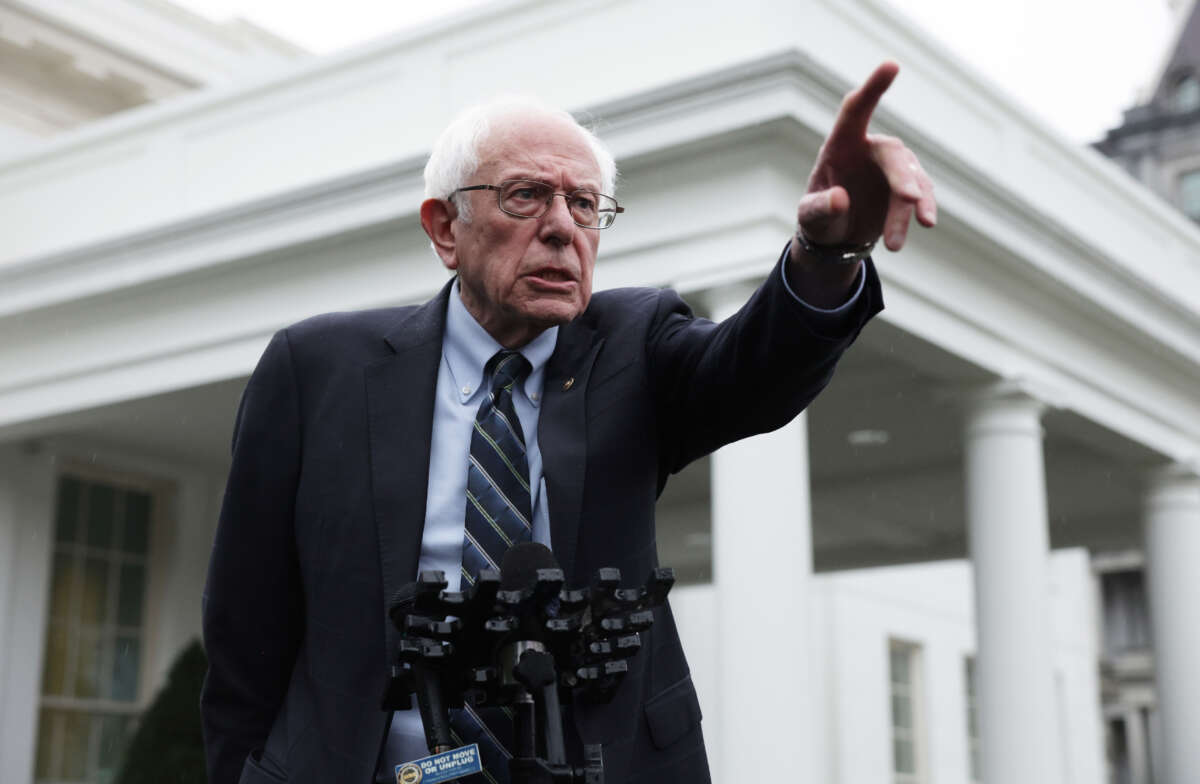Did you know that Truthout is a nonprofit and independently funded by readers like you? If you value what we do, please support our work with a donation.
In his new role as the chair of the powerful Senate Health, Education, Labor and Pensions (HELP) Committee, Bernie Sanders (I-Vermont) is calling for the minimum wage to be raised for the first time in nearly 14 years, saying that the old benchmark of $15 an hour is no longer enough.
On MSNBC on Sunday, Sanders said that it is time for the federal minimum wage to be raised to at least $17 an hour, if not more. This would be nearly 2.5 times the current federal minimum wage of $7.25 an hour, which was set in 2009.
“A couple of years ago, we fought to raise the minimum wage to $15. As a result of inflation, in real dollars, that should be at least $17 right now,” Sanders told MSNBC’s Ali Velshi.
“Here’s the bottom line: you’ve got over 60 percent of the people in this country living paycheck to paycheck, tens of millions are working at starvation wages,” he continued. “It is not too much to ask the wealthiest country on Earth where we have massive income and wealth inequality, people on top doing phenomenally well, to say that in America, if you’re working 40 hours a week, you’re not living in poverty.”
In 2021, Sanders and progressive lawmakers fought to have a provision increasing the minimum wage to $15 an hour included in the Democrats’ budget reconciliation bill. But the provision was dropped from the package due to uniform opposition from Republicans and figures like Senators Joe Manchin (D-West Virginia) and Kyrsten Sinema (I-Arizona), and unwillingness from Democrats to overrule the Senate parliamentarian who ruled that the minimum wage wasn’t sufficiently related to the federal budget.
Because of extremely high inflation rates over the past year, $15 is about equivalent to $17 now. In fact, $15 an hour was already insufficient in 2021, many activists said; workers have been waging the “Fight for $15” since 2012, and research done in 2021 by the National Low Income Housing Coalition (NLIHC) found that a worker making $15 an hour working 40 hours a week wouldn’t be able to afford to rent an average two bedroom apartment in any state in the U.S.
If the minimum wage had risen with productivity in past decades, perhaps better reflecting workers’ contributions to the economy, the minimum wage would be over $23 now, economists say. If it had risen at the same rate that Wall Street employee bonuses have risen since the 1980s, meanwhile, it would be $61.75 per hour.
“The price of housing has soared in recent years. If you’re an average worker, my god, you’re paying $1,500 a month to put a roof over your head and your child’s head,” Sanders said. “The bottom line is — this is not complicated — you’ve got an economy right now that is doing great, fantastic, for the 1 percent. How about creating an economy that works for ordinary Americans? That means you raise the minimum wage to a living wage.”
With Congress dragging its feet on raising the minimum wage, the current value of the minimum wage is extremely low. The Economic Policy Institute (EPI) found last July that the value of the federal minimum wage has declined by 27 percent since it was established in 2009, reaching its lowest point since 1956. This has an effect not only on workers who are paid minimum wage, but also across the economy, as the value of the minimum wage has ripple effects across workers whose wages aren’t directly dependent on the federal threshold.
It’s unlikely that Republicans will pass legislation to raise the minimum wage any time soon, as the party is currently working on plans to put even less money in the hands of the working class. In this moment, however, Sanders said that it is important for Democrats to introduce legislation that puts on display the cruelties of the Republican agenda.
Though House Republicans are discussing cutting Social Security, Sanders told Velshi that he plans to introduce legislation this week that would increase Social Security payments by ensuring that the wealthiest Americans pay a share of their incomes that is equivalent to what the rest of the country pays into the program.
“I think our job in the Senate is to put concrete ideas on the table that the American people will say, ‘yeah, we should raise minimum wage. Yes, we should raise the benefits for low income seniors and improve the solvency of Social Security,’” Sanders said. “I think if we do our job, people will see the contrast between serious legislating and what goes on in the House.”
A terrifying moment. We appeal for your support.
In the last weeks, we have witnessed an authoritarian assault on communities in Minnesota and across the nation.
The need for truthful, grassroots reporting is urgent at this cataclysmic historical moment. Yet, Trump-aligned billionaires and other allies have taken over many legacy media outlets — the culmination of a decades-long campaign to place control of the narrative into the hands of the political right.
We refuse to let Trump’s blatant propaganda machine go unchecked. Untethered to corporate ownership or advertisers, Truthout remains fearless in our reporting and our determination to use journalism as a tool for justice.
But we need your help just to fund our basic expenses. Over 80 percent of Truthout’s funding comes from small individual donations from our community of readers, and over a third of our total budget is supported by recurring monthly donors.
Truthout has launched a fundraiser to add 432 new monthly donors in the next 7 days. Whether you can make a small monthly donation or a larger one-time gift, Truthout only works with your support.
